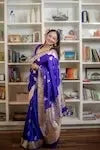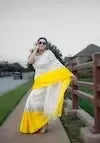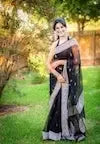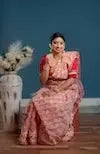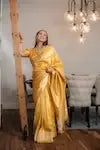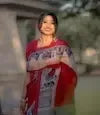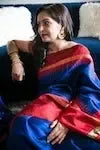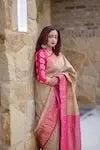Pure Chiffon Saree in Light Cream Color with Allover...
Pure Chiffon Saree in Light Pista Green and Wine Col...
Pure Chiffon Saree in Light Blue and Purplish Magent...
Pure Chiffon Saree in Dark Purple Color with Allover...
Banarasi Silk Saree
The banarasi-silk-saree is not just an outfit. It is a handwoven heirloom. Born in the historic city of Varanasi, each saree tells a story of India’s royal past, unmatched craftsmanship, and cultural pride.
With luxurious silk blends and sparkling zari work, the sarees are created to hold their place through the years. We bring this tradition to your life at IndyVogue. Combining the age-old charm with your contemporary life.
Exclusive, High-Quality Crafts and Original Designs
All our banarasi-silk-saree pieces are handworked by veteran craftsmen, several of whom have family traditions dating back centuries. The floral designs, the brocade borders, and the Mughal-style motifs are not merely ornamental. They are a signature. Whether you opt for katan for its opulence or georgette for its flowing drape, each drape is infused with skill, patience, and ageless beauty.
Ideal for Every Occasion
These sarees aren’t limited to weddings alone. Banarasi silk is just as perfect for religious festivals, family gatherings, or elegant winter evenings. For brides, our heavier pieces in red and gold make a statement. For everyday sophistication, lighter tones and weaves like Tanchoi offer versatility without compromising tradition.
Why Select IndyVogue for Banarasi Silk Saree?
At IndyVogue, we are committed to never compromising on authenticity. That is why our sarees carry the Silk Mark Certification, the sign of purity and trust.
From the extensive range of Banarasi sarees to the custom-stitched blouse packages and convenient online shopping across the USA, our carefully selected designs perfectly blend tradition and fashion with each fold.
Shop your favorite Banarasi-silk-saree today!
Discover the collection, become enamored with history through one of our pieces, and have it become your ultimate signature look. At IndyVogue, the past is always the new fashion trend. Directly shipped to you.
FAQs
1. Are IndyVogue’s Banarasi sarees made of pure silk?
Yes, all pieces in our Banarasi-silk-saree collection are designed using genuine silk only with Silk Mark Certification, the government-approved seal which guarantees authenticity and purity.
2. What makes Banarasi silk sarees so special?
They are handwoven in Varanasi by master craftsmen using ancient methods. The delicate zari work, brocade borders, as well as the motifs in the Mughal style, reflect centuries of royal and cultural tradition.
3. How can I decide between Katan, Georgette, or Tanchoi weaves?
If you enjoy rich texture and royal sensibilities, choose Katan. For parties, go in for Georgette with its lighter, flowing drape. Tanchoi is ideal for everyday elegance with less weight but beautiful detailing.
4. Are Banarasi sarees suitable to be worn at non-marriage functions?
Yes. Sarees fit every occasion from festive pujas to formal dinners. We have lightweight weaves perfect for informal functions, whereas heavier reds and golds are perfect for weddings.
5. Are custom blouse stitching options available?
Absolutely! IndyVogue provides custom-stitched blouse sets in accordance with your size and style preferences. Look for it in the checkout process.
6. How long does delivery take in USA?
Orders are processed promptly and usually delivered within 7–12 business days. We ship directly from India to your doorstep.
7. Are your designs exclusive?
Yes. We have only limited-edition, handcrafted pieces, so you will get an exclusive saree which is neither mass-produced nor easily found elsewhere.
8. How should I look after my Banarasi saree?
It should be dry cleaned. Store it in muslin cloth and avoid hanging it for extended periods to maintain the weave.
9. Can I exchange or return a saree?
Yes, we have easy returns and exchanges. See our full returns policy on the website for timescales and terms.
10. Why use IndyVogue compared to alternative brands?
We blend genuine craftmanship, Silk Mark guarantee, sophisticated designs, and guaranteed global delivery—and bring timeless tradition to the modern wardrobe.
BANARASI SILK SAREE
The Banarasi silk saree is a product of India’s rich culture and heritage. It is an integral part of any significant Indian event, especially weddings and festivals. But above all, it is the living testament of a glorious weaving tradition that dates right back to the Mughal Era.
HISTORY OF THE BANARASI SILK SAREE
Any piece of clothing that has an ancient origin is bound to have a history behind its existence. The story of the Banarasi silk saree also goes back a long way, and is a fascinating one. It goes hand-in-hand with the magnificent past of the city of Varanasi, and its rise as India’s weaving center.
“Banaras is older than history, older than tradition, older even than legend and looks twice as old as all of them put together.” – Mark Twain
Varanasi, or Banaras, as it was called earlier, was a cultural heritage since the beginning of time. With its rich knowledge, philosophy, culture and flourishing arts and crafts, it can be rightfully called the center of the Hindu Renaissance. It had a glorious tradition of brocade weaving, and has, on many occasions, earned the title of India’s weaving center. Banarasi silk works have been mentioned in the Mahabharata and the Ramayana (where it has been referred to as Hiranya Vastra). In Pali literature, Banaras has been acknowledged as a famous weaving hub. Details regarding the technique of weaving Banarasi silk sarees can be found in the jataka tales. It is also said that when Gautama Buddha attained nirvana (enlightenment), his body was wrapped in a Banarasi fabric which reflected dazzling rays of light. One of the most famous commodities that Banaras has contributed to the world is, of course, the Banarasi silk saree. So, when exactly did the Banarasi saree come into existence?
The weaving of brocades with silver or gold zari came into being in the 14th century Mughal era. The Mughal rulers greatly promoted the silk weaving industry. During the flood and famine of 1603, silk weavers from Gujarat migrated in large numbers to Banaras, where the weaving of silk brocades developed in excellence over the course of the next two centuries. Throughout the years, silk weavers of Banaras mastered the art of weaving Banarasi silk sarees, took the craft to a level of perfection and today, no Indian wedding is complete without this garment.
While the fascinating story of the origin of the Banarasi silk saree has not been forgotten by history, it is the unique designs and patterns of this garment that makes it so popular even among today’s generation. Many historians note that initially, the Banarasi silk sarees contained a relatively large amount of Hindu motifs and symbols. This soon came to an end, however, and the Banarasi silk sarees that we wear and see in the market today have designs mostly influenced by Mughal and Persian traditions. These include floral and leafy designs such as kalga and bel, jaals and shikargarh motifs. Apart from these, maangai or mango-shaped motifs, checks and striped patterns can also be found typically on banarasi silk sarees.
An interesting fact that should be noted is that though the Banarasi silk saree has found its way to the wardrobe of the common person, it started off as a costume crafted exclusively for the royalty. During the British era as well, it gained popularity among the affluent, upper-class women.
LESSER-KNOWN FACTS ABOUT THE BANARASI SILK SAREE
- Types of Banarasi sarees – On the basis of the material used, the Banarasi silk saree has 4 main varieties: Katan (pure silk), Organza (kora), Georgette, and Shattir (a blend of silk and cotton yarn). On the basis of the design process, Banarasi silk sarees can be categorized into Jangla, Tanchoi, Vaskat, Butidar, etc.
- Weaving process - A Banarasi silk saree can take up to about 30 days to be made. Typically, it requires at least 3 weavers: one that weaves the silk, the one who is in charge of the revolving ring making the bundles, and the one who takes care of the border designs.
- The details - A Banarasi silk saree should ideally feature about 5600 threads of about 45 inches each.
- The designs - Apart from symbols belonging to the Mughal era, the Banarasi silk saree can also feature other motifs, out of which the Shikargarh is an extremely popular one. The Shikagari is a unique set of designs that portray different animals dwelling in the forest, as well as hunting scenes. Most designs on the Banarasi silk saree include inspirations from nature. A characteristic feature is the combination of gold or silk zari alongside coloured silk threads.
- The technique - The patterns on the Banarasi silk saree are usually done by dobby or jacquard attachments as well as jaala weaving, and it can involve silk on silk, silk on cotton as well as zari on silk. The designs are made with additional yearns that are usually inserted in the weft-wise direction. One special technique that must be mentioned here is the ‘Minakari’, in which the motifs are woven with a colour that stands out from the rest of the saree and matches with the jewelry. These motifs are untwisted and hence appear elevated. Other motif designs include the Chrysanthemum buta, the Keri buta, the Ari jhari and the Ganga jamuna style.
- The uniqueness - Apart from its intricately woven eye-catching designs, the Banarasi saree also owes its popularity to its material, that is, high-quality silk.
- Weaving sectors - In Varanasi, there are two prominent weaving sectors - Alaipura and Madanpura. While the Madanpura weavers adhere to more traditional designs, the Alaipura weavers try to bring in innovation and ingenuity. Other weaving centers include Lohta, Lallapura, Khojwan, etc.
- Colors - Earlier, the exclusive use of vegetable dyes in making the Banarasi silk saree was the trend, but now, chemical dyes are employed because they are cheaper.
WHEN YOU SHOULD WEAR THE BANARASI SILK SAREE
- Weddings - The most obvious answer to when one should wear the Banarasi silk saree is, of course, a wedding. In places like West Bengal, especially, brides almost always opt for the Banarasi silk saree on their wedding day. But you can indulge in the Banarasi silk saree even as a guest - the luxurious silk material will only add to the grandeur of the event.
- Religious or cultural festivals - Once again, the topic of West Bengal must be brought in, as the Banarasi silk saree is often donned by Bengali women on the days of the Durga Puja, as well as during other religious events. So if you are looking for a suitable saree to wear during the Ashtami anjali or Dashami’s sindur khela, a Banarasi silk saree is the way to go!
- Winter - The Banarasi silk saree is especially suited to the winter season, as it provides a feeling of lush comfort.
THINGS TO CONSIDER WHILE WEARING A BANARASI SILK SAREE
It is very important to pay attention to where you are planning to wear a Banarasi silk saree.
- Weddings - Are you wondering what to wear to a wedding? Well, you might want to opt for a weightier, more heavily embroidered Banarasi silk saree, perhaps one that comes in a shade of red. You can style it with heavy gold or silver jewelry. It will help emphasize the significance of the event in question.
- Parties/Gatherings - For a family gathering or a casual gathering, you should go for a lighter option, such as a chiffon georgette or a Tanchoi Banarasi. In this case, orange or blue will be a better choice. You can pair it with a sleeveless blouse and more lightweight jewelry, such as chokers, studs or bracelets.
- Formal events - For a more formal event, the Chanderi Banarasi will be a better option. Its lightness makes it a smart wear for any occasion, and you will be able to move more freely as it will not restrict your movements.
TIPS TO TAKE CARE OF YOUR BANARASI SILK SAREES
- Dry cleaning - Try NOT to wash your Banarasi silk saree at home. Dry cleaning is always advisable, and only when it is necessary.
- Do NOT use naphthalene balls - Storing any kind of chemical material with your Banarasi may lead to a reaction with the fabric, leaving stains. Do not spray perfume on the material either.
- Use of cotton and newspapers - Fold and place your Banarasi saree carefully in a cotton cloth, and place newspapers within the folds to avoid wrinkles and creases.
- Ironing - If you are ironing your Banarasi at home, place it below a cotton cloth first.
- Storage - Keep your Banarasi in a cool place with less moisture.
- Folding - Remember to always fold your Banarasi silk saree in such a way that the outer part containing the main embroidery is placed inside. Otherwise, the intricate details may be damaged.
- Regular usage - Do remember to take out your Banarasi every few months out of its storing place and refold it. Lack of usage for a long time may cause fragility.
WHAT TO REMEMBER WHILE SHOPPING BANARASI SAREES ONLINE
While buying Banarasi sarees online, it is important to verify that the material you are purchasing is authentic. What are some common ways of identifying a genuine Banarasi silk saree?
- The Silk Mark - Always remember to ask for a Silk Mark Certificate of Authorized Use while buying a Banarasi. The presence of this mark means that the saree is made out of pure, natural silk and is authentic.
- Product details - Don’t forget to read up on the product details that are usually attached on any online site that deals in clothing. It is always important to pay attention to the dimensions and especially the weight of the saree. Banarasi sarees are expected to be heavier as compared to most other sarees.
- Distinct designs - Make sure that the Banarasi you are purchasing has clearly visible motifs devoid of any kind of blurring or overlapping. A good-quality Banarasi will always have clear and vivid designs.
- The silk quality - Do watch out for the quality of the material you are purchasing. A good-quality Banarasi saree always has a smooth, tender texture.
- Customer reviews - One of the easiest and most effective ways of making sure that the saree you’re purchasing is of good and pure quality, is of course, reading the customer reviews. Customer reviews guide your shopping choices while presenting the experiences of those who have bought the product before you, so remember to check them out.
HOW ARE BANARASI BROCADES INFLUENCING THE MODERN FASHION WORLD?
Though the Banarasi silk saree has an ancient legacy that traces back to centuries ago, it retains its position of being one of the most popular traditional garments of all time. In today’s world of ‘effortless’ fashion, a heavily embroidered piece like the Banarasi is being paired with contemporary clothing to give rise to innovative and unique costumes. An example is Alexander Mcqueen, who paid tribute to the textiles of India by creating saree-like dresses with Banarasi silk borders. Louis Vuitton did a similar thing with Banarasi-inspired designs. Ferragamo created shoes with the Banarasi brocade. In one of Marchesa’s Spring Ready-To-Wear collection, the brand made dresses containing drapes and borders with Banarasi designs. Such examples are multiple, and these are only a few of them. The Banarasi silk saree is a timeless piece that will never run out of style, because it is this very timelessness that makes it so unique and brings to our mind a sense of nostalgia every time we don it.
Explore Our Collection
Suits & Dresses
Festive Wear Salwar Suits USA |
Collections By Type
Art Silk Sarees | Baluchari Silk Sarees | Banarasi Silk Saree | Bengal Cotton | Bishnupuri Silk Sarees | Chanderi Silk Sarees | Crepe Silk Sarees | Dupion Silk Sarees | Embroidery Sarees | Gadwal Silk Sarees | Georgette Silk Sarees | Ikat Silk Saree | Jamdani Saree | Kanchipuram / Kanjeevaram Silk Saree | Kani Silk Saree | Latest Saree Collection | Linen | Matka Silk Sarees | Paithani Saree in USA | Pure Organza Silk Sarees | Pure Silk Sarees | Raw Silk Sarees | Sale | Sambalpuri Silk Sarees | Tissue Sarees | Tussar Silk Saree |
Collections By Work
Bandhani Sarees | Hand Embroidery Sarees USA - Kantha Stitch Saree | Hand Painted Sarees | Kalamkari Sarees | Machine Embroidery Sarees | Printed Sarees | Sequin Sarees Collection |
Collections By Region
From the East | North Indian Sarees | Sarees of Central India | South Indian Silk Sarees | West Indian Saree |Collections By Occasion
Baisakhi Collection | Bollywood Sarees | Casual Wear Sarees | Cocktail Sarees | Festival Collection Saree | Party Wear Sarees | Saraswati Puja Collection | Valentine's Day Collection | Wedding Collection Saree |
Collections By Color
Black Saree Collection | Blue Sarees Collection | Golden Sarees Collection | Green Sarees Collection | Maroon Sarees Collection | Orange Sarees Collection | Pink Sarees Collection | Purple Sarees Collection | Red and White Saree Collection | Red Sarees Collection | White Sarees Collection | Yellow Sarees |
Collections By Price
Under $100 USD | Under $150 USD | Under $200 USD | Under $300 USD | Under $400 USD | Under $500 USD |
Special Collections
Double Savings Collection | Silk Mark Certified Saree | The Kolkata Collection |
Accessory Collections
Designer Blouse Online | Indian Fashion Jewellery | Trendy Designer Bags |


